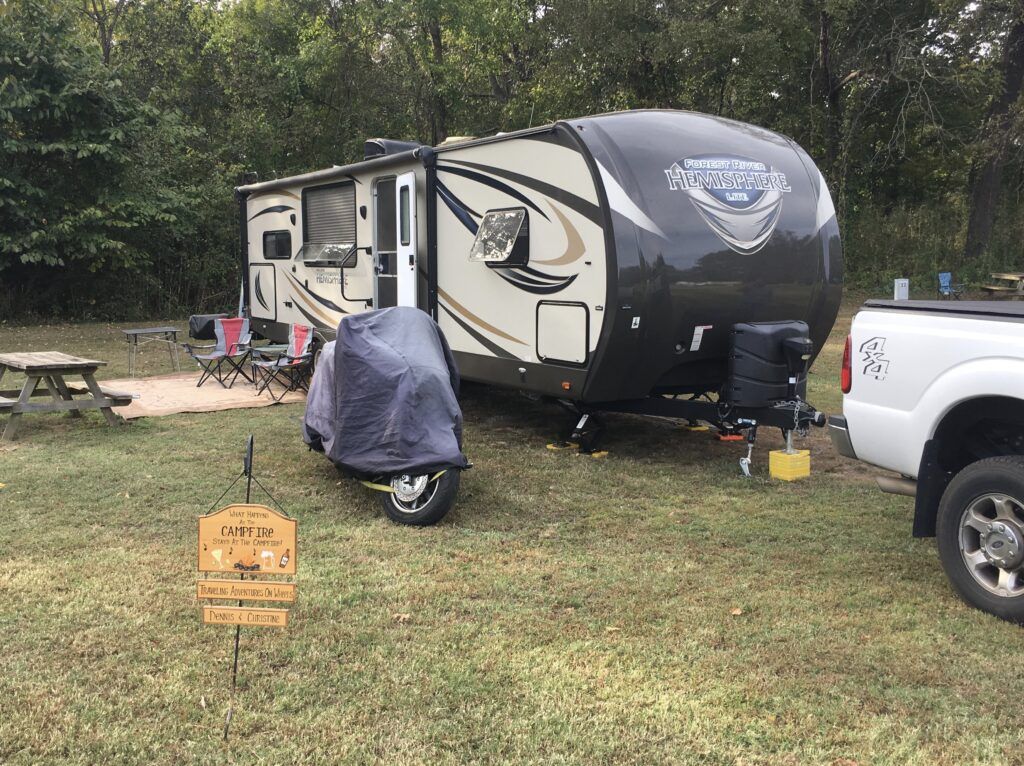
What Is It Like To Live In An RV?
The concept of downsizing and embracing a simpler lifestyle has gained popularity, especially among seniors seeking flexibility, affordability, and adventure in their retirement years. Living in an RV in a mobile home park or campground can be an attractive alternative to traditional housing. In this post, I will break down the costs, amenities, lifestyle, and maintenance considerations of RV living, along with the pros and cons to help seniors make an informed choice. It is what I am currently doing and I have no plans to change it. I love it!!!
Living in an RV offers a unique blend of mobility and community. RV parks and mobile home campgrounds are designed to accommodate the needs of travelers and long-term residents alike, providing amenities and resources to support a comfortable lifestyle in a compact space. Seniors who choose RV living often enjoy a close-knit community with other like-minded individuals, whether they stay at a single location or travel seasonally.
However, RV living requires adapting to a smaller space, a simpler way of life, and often a more proactive approach to managing utilities and maintenance. Downsizing is probably the hardest part if you are used to living in a large home. I promise you once you do it you will be surprised at how much “stuff” you just don’t need. Let’s dive into the details of cost, amenities, independence, and maintenance to see if this lifestyle suits you.
Comparing Costs: RV Living vs. Traditional Housing
One of the primary motivators for seniors considering RV living is cost savings. Here’s how RV living stacks up against traditional housing in terms of expenses:
- Purchase Cost:
- RV: A new or used RV can range from $10,000 to over $100,000, depending on its size and amenities. However, for seniors who already own an RV, this initial investment may already be covered. On a side note, the older ones (built pre-covid) are usually of better quality than the newer ones. Some mobile home/RV parks have a 10-year rule where you either have to be pre-approved or they won’t accept them at all.
- Home: Buying a house can be far more expensive, with prices in most areas starting at $150,000 to well over $300,000. For many seniors, this cost is prohibitively high, especially if they plan to downsize.
- Monthly Expenses:
- RV Living: Monthly expenses for living in an RV can be lower, with campground or mobile home park fees typically ranging from $300 to $1500 per month, depending on location and amenities.
- Traditional Housing: Monthly costs, including mortgage or rent, utilities, and maintenance, are often higher. Rent can range from $1500 to over $4,000 monthly, depending on the location and type of housing.
- Utilities:
- RV parks often bundle utilities such as water, sewage, and trash disposal in the monthly fee. Electricity may also be included, although most parks charge separately based on metered electricity.
- For traditional housing, utility bills are typically an additional monthly expense. For a small home, this could range from $500 to over $1000 monthly.
- Property Taxes and Insurance:
- Usually, RV owners don’t pay property taxes (it’s included in your lot rent) and generally less for insurance compared to homeowners. RV insurance can be as low as $200-$600 annually, depending on the coverage level. I pay about $600 annually for what’s known as a “full-timers” policy. There are only a handful of insurance companies that offer it.
- Homeowners face property taxes and more costly home insurance policies, which can total several thousand dollars annually.
Overall, living in an RV often translates to significant savings, making it an attractive option for seniors on a fixed income. In the area I am in Florida my costs are less than half of what I would pay for a 1 bedroom apartment and forget about the savings compared to buying a house.
Amenities in Mobile Home and RV Parks
Many mobile home parks and RV campgrounds cater to long-term residents and provide a variety of amenities to create a comfortable, community-centered lifestyle. Typical amenities include:
- On-site Laundry Facilities: Most RV parks have laundry facilities, eliminating the need to travel for laundry services.
- Community Centers and Clubhouses: These spaces host social gatherings, game nights, and community events, providing opportunities to make friends and stay active.
- Recreational Facilities: Pools, fitness centers, hiking trails, and sometimes even golf courses are common in larger RV parks, making it easy to stay physically active.
- Wi-Fi and Cable: Some parks offer free Wi-Fi and cable, while others provide options to subscribe for enhanced service. We have the local cable company’s internet, and it’s awesome.
- Basic Utilities: Water, trash, and sewage services are usually included in the monthly rental fee, and some parks (very few) also cover electricity.
- Parking: You will have your own on-site parking next to your RV.
These amenities vary by park, so it’s wise to visit prospective parks and inquire about the available amenities before committing.
Independence and Lifestyle Considerations
Living in an RV offers a unique level of independence and flexibility. Unlike traditional housing, which requires a significant investment and commitment to one location, RV living allows seniors the freedom to move to new places or even travel full-time. If you decide you want to experience winter in a warmer climate, you can relocate your RV with minimal hassle. We moved around the country for over 6 years but are now stationary in one park on the Space Coast of Florida.
Additionally, many seniors appreciate the simpler lifestyle that RV living brings. With limited space, there is less need to manage belongings or perform extensive home upkeep, allowing for a focus on experiences rather than possessions. This minimalist approach can be liberating for those who want to reduce the burden of traditional home ownership.
However, it’s essential to consider the adjustment to a smaller space. Living in an RV requires some level of physical fitness and adaptability, as space is limited, and tasks such as hooking up to utilities or driving the RV may demand moderate physical exertion. Moving from place to place is another whole issue. There is a lot of work involved in that. That’s why I have chosen to be stationary.
Maintenance Issues to Expect
Like any home, RVs require regular maintenance. Here are a few common maintenance considerations for seniors living in RVs:
- Exterior Care: RV exteriors need periodic cleaning, especially after traveling long distances. Protective coatings are also available to reduce wear from the elements.
- Plumbing and Electrical: RV plumbing and electrical systems are generally simpler than home systems but may need regular inspection and occasional repairs. You are only responsible for the water and electricity from the power pedestal and water spigot to your RV and inside the RV. The park is responsible for getting electricity to the power pole and water to the spigot. RV parks typically have a board in the common area with the names of RV maintenance and repair companies and recommended service providers to assist with issues if you are not handy. I do all my maintenance and repair work, keeping those costs to a minimum.
- Interior Maintenance: Since space is limited, regular organization is essential. Keeping things clean and tidy can make a small space feel much larger and more comfortable.
- Winterization: In colder climates, RVs need winterizing to protect pipes from freezing, especially if you plan to leave or live in your RV during the winter months. Many seniors prefer to migrate seasonally to avoid this hassle. I live in Florida, so this is never an issue for me. I never have to winterize!!!…lol.
Many maintenance tasks are straightforward, but some RV owners may prefer to hire a professional for more challenging repairs.
Pros and Cons of Living in an RV
Pros:
- Cost Savings: Lower monthly costs compared to traditional housing, especially for those who already own an RV.
- Community: Many RV parks have a welcoming atmosphere, with frequent social events and gatherings.
- Flexibility: Freedom to travel and relocate without losing your home investment.
- Simplicity: A smaller space can reduce the time and effort needed for cleaning, organizing, and maintenance.
Cons:
- Space Limitations: Small living quarters require careful planning and organization.
- Weather Dependency: RVs are less insulated than traditional homes, making extreme weather conditions challenging.
- Maintenance: Although simpler than home maintenance, RV upkeep is still required and can be costly if not properly managed.
- Limited Amenities in Some Locations: Not all RV parks have extensive amenities, and moving to a new area could mean fewer conveniences.
Final Thoughts
For many seniors, living in an RV offers a blend of affordability, community, and adventure. It can be an ideal option for those looking to embrace a more mobile, minimalist lifestyle while keeping living costs manageable. However, it’s essential to consider the challenges, including space constraints and the ongoing need for maintenance. With careful planning and a good understanding of what RV living entails, many find this lifestyle rewarding and liberating.
Ultimately, living in an RV is a personal choice that depends on individual lifestyle preferences and health considerations. For those who prioritize flexibility, affordability, and a community-oriented atmosphere, RV living can be a fulfilling alternative to traditional housing. As I stated earlier, I have moved around the country for almost 9 years, exploring new areas and having an absolute blast. I am now stationary in my RV near my wife’s grandkids and not too far from some of mine, and travel to new areas via hotels and camping cabins. I wouldn’t change it for anything!!!
Update
At the time I wrote this post, I was happily living the RV life myself and was a big advocate. However, things change.
After much deliberation, my wife and I decided to sell our RV and move into an apartment. This wasn’t an easy decision, and several factors contributed to it.
- No More Traveling: Following a difficult experience in Montana, my wife became uncomfortable with traveling in our RV. (See “Trip From Hell Part 1)
- Maintenance Issues: We realized we weren’t great at keeping up with the RV’s maintenance needs, which became increasingly burdensome. Apartment living eliminates these responsibilities.
- Need for a Solid Structure: Since we weren’t traveling, a traditional home offered better protection against severe weather, particularly the strong storms in Florida.
- Restrictive RV Park Agreement: The RV park’s “Transient Agreement” was concerning, as it offered few rights and the possibility of being forced to move with very little notice. This, combined with the fact that we had already sold our truck, added to the decision to move.
While RV living wasn’t the right long-term choice for us, I still believe it can be a good option for other seniors. By no means are we done traveling and exploring. We’ve now switched to tent camping, motels, and cabins for our travels.
Did you enjoy this post? Do you want to know when the next post comes out? Consider subscribing. I only send update emails once a week, usually on Friday. Try it out. You can unsubscribe at any time.
